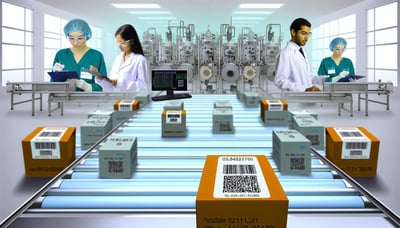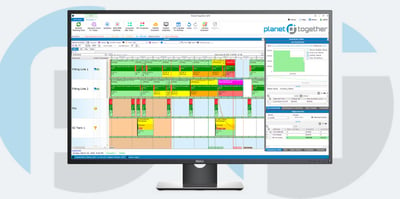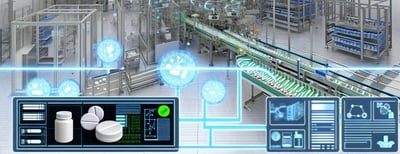Production Planning for Batch Traceability
In the highly regulated world of pharmaceutical manufacturing, ensuring batch traceability is of utmost importance. As a Plant Manager, you are well aware that a single oversight in the production process can have far-reaching consequences. Not only does batch traceability help you meet stringent regulatory requirements, but it also enhances product quality, reduces risks, and boosts overall operational efficiency.
In this blog, we will look into the critical aspects of production planning for batch traceability and how integrating advanced planning and enterprise resource planning (ERP), supply chain management (SCM), and manufacturing execution system (MES) software can significantly streamline your operations. Specifically, we will explore the integration between PlanetTogether and industry-leading ERP and SCM systems like SAP, Oracle, Microsoft, Kinaxis, Aveva, and others to achieve the highest level of batch traceability.

Batch Traceability
Batch traceability, also known as lot traceability, is the ability to trace the history, location, and distribution of a product from its inception to the end of its life cycle. This includes tracking the movement of raw materials, production processes, quality control checks, packaging, and distribution. In the pharmaceutical industry, ensuring batch traceability is a legal requirement and a fundamental element of good manufacturing practices (GMP).
The key components of batch traceability include:
Identification and Labeling: Each batch of pharmaceutical product should have a unique identifier or batch number. This identifier should be clearly labeled on the product's packaging, allowing for easy tracking.
Data Collection and Record Keeping: Accurate and comprehensive data collection is essential. This includes recording every step of the manufacturing process, from raw material procurement to final packaging. All data must be stored securely and made readily accessible for auditing purposes.
Production Documentation: Detailed production records should be maintained, including batch records, standard operating procedures (SOPs), and equipment maintenance logs. These records help trace the entire production history.
Quality Control and Testing: Regular quality control checks and testing should be conducted throughout the production process. Any deviations from the established quality standards must be documented and addressed promptly.
Inventory Management: Precise inventory management is crucial. It involves tracking the movement of raw materials and finished products in real-time to prevent discrepancies and ensure batch integrity.

The Challenges of Batch Traceability
Achieving batch traceability in pharmaceutical manufacturing is not without its challenges:
Complex Supply Chains: Pharmaceutical supply chains are often complex, involving multiple suppliers and distributors. Maintaining traceability across the entire supply chain can be daunting.
Stringent Regulatory Compliance: The pharmaceutical industry is heavily regulated, with requirements such as the FDA's Drug Supply Chain Security Act (DSCSA) in the United States. Compliance is mandatory and demands meticulous record-keeping.
Data Volume and Complexity: The sheer volume of data generated in pharmaceutical manufacturing is substantial. Managing, analyzing, and reporting on this data can be overwhelming without the right tools.
Production Scheduling: Coordinating production schedules to ensure traceability while optimizing efficiency can be challenging. Delayed production can lead to increased costs and missed market opportunities.
Integration of Systems: Many pharmaceutical manufacturers rely on a variety of software systems for different aspects of their operations, such as ERP, SCM, and MES systems. Ensuring seamless integration between these systems is crucial for effective traceability.
![]()

PlanetTogether and Batch Traceability
PlanetTogether is a powerful production planning and scheduling software that specializes in optimizing manufacturing processes, including those in pharmaceutical facilities. It can be a game-changer when it comes to achieving batch traceability. Here's how:
Efficient Production Scheduling: PlanetTogether uses advanced algorithms to optimize production schedules. It takes into account resource availability, order priorities, and constraints, ensuring that production runs smoothly while maintaining batch traceability.
Real-time Visibility: The software provides real-time visibility into your production process. This means you can track the progress of each batch and identify any deviations or delays immediately, allowing for rapid corrective actions.
Resource Allocation: With PlanetTogether, you can allocate resources more effectively. This ensures that the right equipment and personnel are available when needed, reducing the risk of production bottlenecks and ensuring traceability.
Scenario Planning: PlanetTogether allows you to run "what-if" scenarios to assess the impact of various production strategies on batch traceability. This helps you make informed decisions and optimize your processes.

Integrating PlanetTogether with ERP, SCM, and MES Systems
To achieve the highest level of batch traceability, it's essential to integrate PlanetTogether with your existing ERP, SCM, and MES systems. Let's explore how this integration can be beneficial:
Seamless Data Exchange: Integration ensures that data flows seamlessly between PlanetTogether and your other systems. This means that production schedules, inventory levels, and quality control data are always up to date.
Streamlined Workflows: By integrating these systems, you can automate many of your manufacturing workflows. For example, when a batch is scheduled in PlanetTogether, the necessary production orders and inventory adjustments can be automatically generated in your ERP system.
Enhanced Reporting: Integration allows for the consolidation of data from various sources, providing a holistic view of your operations. This facilitates better reporting and analytics, which are critical for batch traceability and regulatory compliance.
Inventory Management: With real-time inventory data from your ERP and SCM systems, PlanetTogether can make more accurate production scheduling decisions. This reduces the risk of overproduction or material shortages that can compromise traceability.
Quality Control Integration: MES systems are often responsible for quality control processes. Integrating with PlanetTogether ensures that quality control checks are seamlessly incorporated into the production schedule, enhancing traceability.
Choosing the Right Integration Approach
The choice of integration approach depends on your specific systems and requirements. Here are some common integration methods:
API Integration: Many modern software systems offer Application Programming Interfaces (APIs) that allow for seamless data exchange. PlanetTogether can be integrated with systems like SAP, Oracle, Microsoft, Kinaxis, Aveva, and others using their respective APIs.
Middleware Solutions: Middleware solutions like MuleSoft or Dell Boomi can act as intermediaries, facilitating data exchange between systems. These can be particularly useful if you have a complex mix of software in your manufacturing environment.
Custom Development: In some cases, custom development may be necessary to create a tailored integration between PlanetTogether and your ERP, SCM, and MES systems. This approach provides flexibility but may require more time and resources.
Consultation with Software Providers: Reach out to your software providers for guidance on integration. They may have pre-built connectors or partnerships with integration experts to simplify the process.
Managed Services: Consider engaging a managed services provider specializing in integration. They can help design, implement, and maintain a robust integration solution tailored to your needs.

Benefits of Integration for Batch Traceability
Integrating PlanetTogether with your ERP, SCM, and MES systems offers numerous benefits for batch traceability:
Real-time Data Access: All stakeholders have access to real-time data, ensuring that everyone is working with the most up-to-date information. This is critical for maintaining traceability.
Reduced Errors: Manual data entry and transfer errors are minimized, reducing the risk of traceability gaps or inaccuracies.
Faster Response to Deviations: Integration enables immediate detection of deviations in the production process. Rapid corrective actions can be taken to prevent quality issues and non-compliance.
Efficient Resource Utilization: Resources are allocated more efficiently, ensuring that production runs smoothly while maintaining traceability.
Comprehensive Reporting: Integrated systems provide comprehensive reporting capabilities, making it easier to generate the documentation required for regulatory compliance.
Enhanced Visibility: With data from various systems integrated into one platform, you gain a holistic view of your operations, facilitating better decision-making.
In the pharmaceutical manufacturing industry, ensuring batch traceability is not just a regulatory requirement; it's a matter of patient safety and product quality. Integrating advanced planning and scheduling software like PlanetTogether with your ERP, SCM, and MES systems can be a game-changer. It streamlines production, enhances traceability, and ultimately leads to better compliance and cost savings.
As a Plant Manager, the decision to invest in integration for batch traceability is a strategic one that can yield significant long-term benefits. It's about not only meeting regulatory demands but also ensuring the trust and confidence of your customers and stakeholders.
By embracing integration and leveraging the power of advanced planning tools, you can navigate the complex landscape of pharmaceutical manufacturing with confidence, knowing that your operations are optimized for batch traceability, quality, and efficiency.
Are you ready to take your manufacturing operations to the next level? Contact us today to learn more about how PlanetTogether can help you achieve your goals and drive success in your industry.
Topics: PlanetTogether Software, Integrating PlanetTogether, Efficient Resource Utilization, Enhanced Batch Traceability and Compliance, Comprehensive Reporting, Enhanced Visibility, Real-time Data Access, Reduced Errors, Faster Response to Deviations, Pharmaceutical Manufacturing, Batch Traceability




















LEAVE A COMMENT